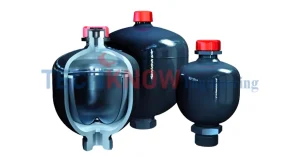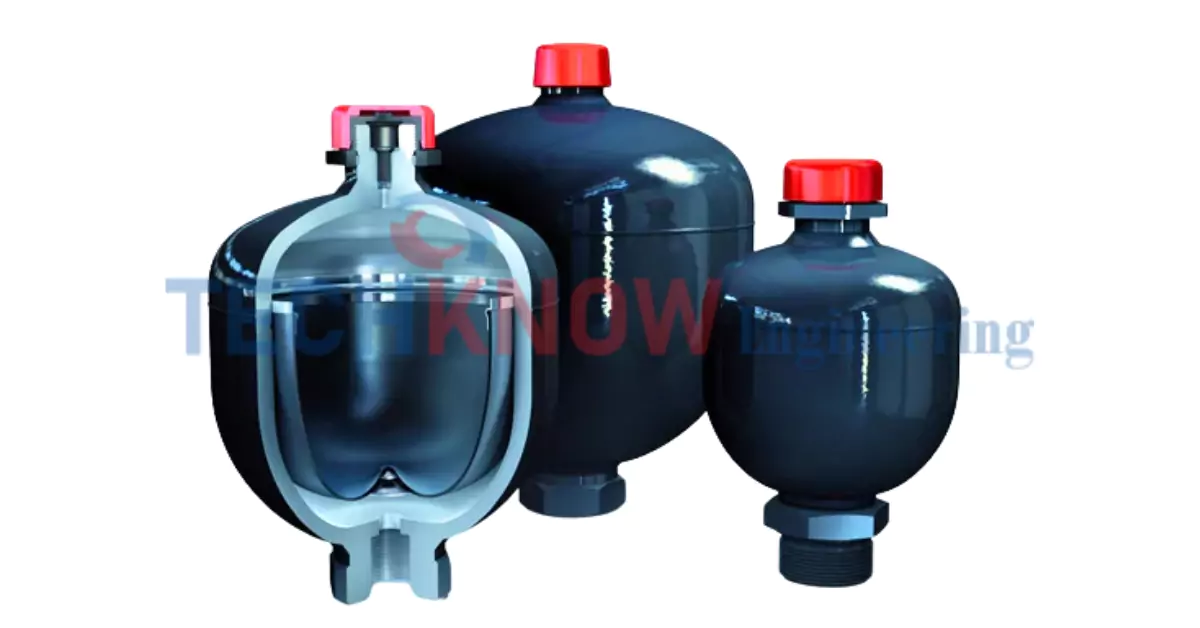How to Maintain Diaphragm Accumulators: A Practical Guide
Diaphragm Accumulators are essential parts of many hydraulic systems. These devices help regulate pressure, store hydraulic energy, absorb shocks, improve machine performance and efficiency and enhance machine safety and efficiency. Like all mechanical parts however, diaphragm accumulators require regular servicing in order to guarantee long term function and safety.
Techknow Engineering Enterprise understands the vital role that diaphragm accumulators play in your operations and has prepared this guide with key steps for maintaining diaphragm accumulators effectively.
Common Problems That Affect Diaphragm Accumulators (DAs)
Understanding what can go wrong is the first step toward effective prevention. One of the more frequent issues is gas leakage: over time, nitrogen may escape through valves or diaphragm imperfections and cause precharge pressure levels to drop significantly.
Diaphragm rupture is another serious risk to system efficiency that often arises, which occurs when its flexible internal diaphragm wears away or breaks, allowing gas and hydraulic fluids to mix, decreasing system effectiveness.
Contamination is another serious worry. Unfiltered hydraulic fluid can quickly wear away internal surfaces and seals while significantly shortening diaphragm life spans. Furthermore, improper installation or vibration could create mechanical stress and speed up wear over time.
How to Recognize Issues Early
Routine inspections are essential in early identification of issues. Conduct a visual check of the external surface of your accumulator for signs of oil leakage, rust or physical damage as well as its base and fittings any oil residue or staining indicates possible failure of diaphragm diaphragms.
Consistent decreases in system performance or strange noises may signal internal issues; keeping track of system pressure readings over time helps pinpoint slow yet serious problems.
Pressure Testing Procedures at Key Maintenance Check Points
Regular pressure checks are crucial. Use an official charging kit to measure nitrogen precharge pressure at least once every month when depressurizing your hydraulic system fully, always when fully depressurized as per manufacturer specifications and read your user’s manual for correct pressure values.
When pressure decreases, only use dry nitrogen as the solution compressed air or oxygen may react badly with hydraulic fluids and cause dangerous explosions.
Precharge Adjustments and Safety Concerns
Whenever adjustments are required, isolate the accumulator from the hydraulic circuit and release all pressure by following trained personnel’s procedures always following in order to avoid injuries and equipment damages.
Maintain Fluid Quality
Hydraulic fluid should remain clean and within its specified temperature and viscosity range in order to avoid internal damage, thus using filters regularly or replacing them as soon as needed to preserve optimal conditions and ensure good fluid hygiene this way failures are likely avoided altogether.
Avoid subjecting your diaphragm accumulator to high temperatures as prolonged exposure will degrade its material and decrease flexibility potentially leading to rupture over time.
When Should a Professional Be Engaged?
Some problems require professional intervention beyond simple inspection, including diaphragm replacement, internal inspections and repairs involving gas chambers. Trust only trained service technicians equipped with appropriate tools and certifications when performing these tasks.
Techknow Engineering Enterprise offers maintenance for top-tier equipment like the diaphragm accumulator for optimal performance and dependability. Even top-of-the-line machinery requires regular checks in order to maintain peak efficiency.
Maintain a Smooth System Running
Regular diaphragm accumulator maintenance will extend their lifespan, improve system performance and decrease risks of unexpected downtime. By performing simple pressure checks, replacing fluid with clean ones and conducting inspections regularly, your diaphragm accumulators will remain safe and productively operating within your hydraulic systems.
Techknow Engineering Enterprise’s expert staff stands ready to offer assistance with servicing, replacement parts installation and system troubleshooting for maximum system uptime and reliability. Call on them now.
Essential Guide to Diaphragm Accumulators Maintenance | Techknow Engineering

Learn 5 essential tips for maintaining Diaphragm Accumulators effectively. Discover how to prevent common issues, ensure long-term performance, and keep your hydraulic systems running smoothly with expert advice from Techknow Engineering.
Product Brand: Techknow Engineering Enterprise
Product Currency: INR
Product In-Stock: InStock
5

